| Srl | Item |
| 1 |
ID:
057698
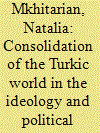

|
|
|
| 2 |
ID:
087193
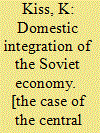

|
|
|
|
|
| Publication |
Budapest, Hungarian Scientific Council for World Economy, 1987.
|
| Description |
no. 56; 126p.
|
|
|
|
|
|
|
|
|
|
|
|
Copies: C:1/I:0,R:0,Q:0
Circulation
| Accession# | Call# | Current Location | Status | Policy | Location |
| 028590 | 330.05/KIS 028590 | Main | On Shelf | General | |
|
|
|
|
| 3 |
ID:
140291
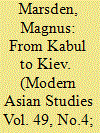

|
|
|
|
|
| Summary/Abstract |
While the territory of Afghanistan is widely connected in the popular and historical imagination to long-distance trade, Afghan society continues to be popularly represented as being made-up of ‘tribes’, who subscribe to static ‘honour codes’, and tenaciously cling to archaic tribal values. This article examines the significance of traders of Afghan background to commodity flows across a wide range of contexts in the former Soviet Union, especially in Russia and Ukraine and the Muslim-majority Central Asian Republics. It charts the social and political backgrounds of the merchants who make up this trading network, the nature of their connections to one another and the forms of mobility that make these connections possible, their complex relations with the communities amongst whom they live, and the types of moral value they attach to their work as traders.
|
|
|
|
|
|
|
|
|
|
|
|
|
|
|
|
| 4 |
ID:
175385
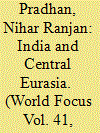

|
|
|
|
|
| Summary/Abstract |
The situation in Central Asia has undergone a sweeping change since 9/11. The region became a pivotal theatre for war against terrorism that enhances its importance internationally. India’s security concerns were inextricably linked to the turbulence in Central Asia, especially in the context of Pakistan and the instability in Afghanistan. Therefore, India has to look afresh to the region.
|
|
|
|
|
|
|
|
|
|
|
|
|
|
|
|
| 5 |
ID:
154592


|
|
|
| 6 |
ID:
142725


|
|
|
|
|
| Summary/Abstract |
The Central Asia had been the centre stage of imperial rivalry between Britain and Russia during the nineteenth century. Though changed in its dimension, the centrality of Central Asia did not diminish even inthe era of New Great Game. The geopolitical realities of the region changed with disintegration of Soviet Unionas well as with the emergence of fiveCentral Asian states, Kazakhstan, Kyrgyzstan, Tajikistan, Turkmenistan and Uzbekistanin the world politics. There are three factors which bring significance to the Central Asian states in theInternational Politics. Geographical location of the region is the first factor which has accrued significance to the region. It is a landlocked area with no access to the Oceans, and thus it needs welldeveloped land routes to access other countries. The second factor is its closeness to the important world powers such as Russia and China. And thirdly these States are rich inenergy resources such as natural gas and oil which gives it an important position in the issues of world politics. All these factors play a significant role indirecting the new phase of the Great Game towards Central Asia.
|
|
|
|
|
|
|
|
|
|
|
|
|
|
|
|
| 7 |
ID:
129410
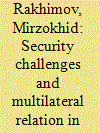

|
|
|
|
|
| Publication |
2014.
|
| Summary/Abstract |
New geopolitics and security Central Asia faced considerable political, social, and cultural changes throughout the whole of the 20th century; since the beginning of the 21st century, the region is confronted to new steps of the geopolitical transformation. Some experts say that Central Asia is returning to the Great Game of the 19th century but with new players. It is well-known that Central Asia historically was in the center or important aspects of interest of different empires and one could say that the region was more or less in Great Game situation during all periods of its history. After the collapse of the Soviet Union, the newly Independent Central Asian republics tried to form new bilateral and multilateral relations and within a short time the Central Asian nations were formally recognized by many countries, which established with most of them diplomatic ties and exchanged diplomatic missions. The region's countries have joined the main international and regional organizations.
|
|
|
|
|
|
|
|
|
|
|
|
|
|
|
|